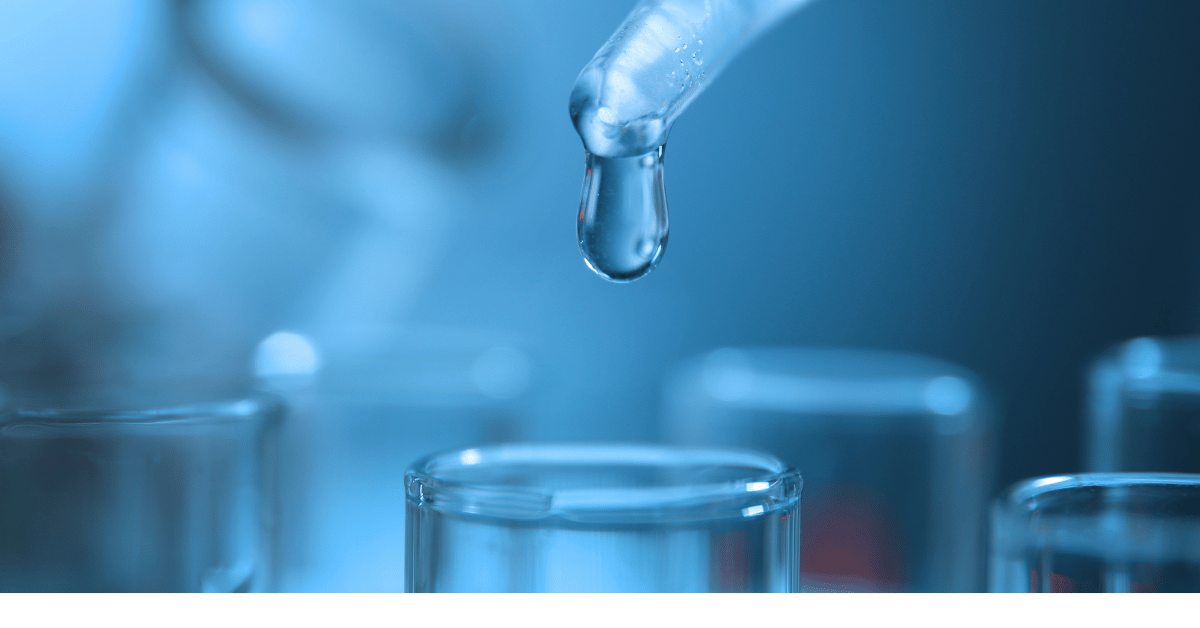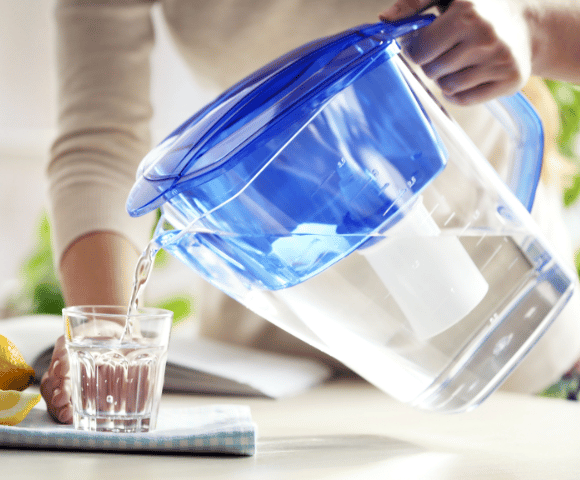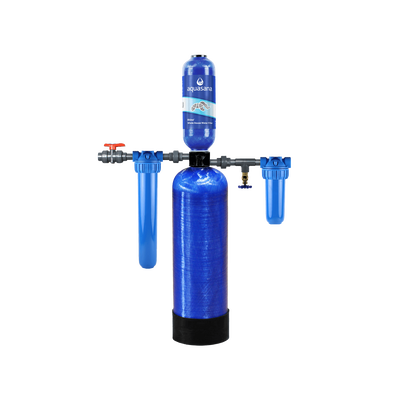Faucet mounted water filters
Another type of water filter is faucet mounted. These are typically easy to install (they screw right onto the faucet head), and some feature a filter directly in the unit attached to the faucet while others have tubing that connects to an external block that sits on your countertop. By connecting to your faucet, they allow seamless access to filtered water straight from the tap. However, these systems may not work with all faucets and some can slow down your flow rate.
When it comes to performance, you’ll likely find many differences, especially if you’re comparing faucet mounted filters with an internal filter (in the unit attached to the faucet) compared to systems that connect to an external block. Systems that do all the filtering internally may offer lesser performance due to sacrifices that favor the form factor, while units that filter through an external block may have better performance because they can include multiple stages of filtration like activated carbon and ion-exchange.
In general, faucet mounted water filters can help with bad odors and taste as well as remove some contaminants such as lead and chlorine. Depending on the certification, some can effectively remove sediment, chemicals, heavy metals, pesticides, and more.
Prices can range from $15 to $80 which put them around the same range as pitchers, but with potentially better performance and greater convenience since you don’t need to worry about refills. Filter lifespan is similar to pitchers, with most systems needing a replacement every two to three months.
Refrigerator water filters
Many modern refrigerators now include a built-in water filter. If you ever get water or ice from your fridge, the water line goes through the filter first. These are easily replaceable and don’t need to be replaced until every 6 months.
Refrigerator filters typically use activated carbon, and thus offer comparable performance to a pitcher or some faucet mounted systems that only use a single stage. However, the dispensers for refrigerator filters may be a danger, as an NSF study found most refrigerator water dispensers had concerning levels of yeast and mold. From our Water Quality Survey, we found that people have shifted away from relying on entry-level refrigerator filters and towards higher-end systems over time.
Refrigerator filters come built-in with your fridge, so there are no upfront costs compared to other systems, though replacements can cost $50 or more and typically need to be replaced twice a year.
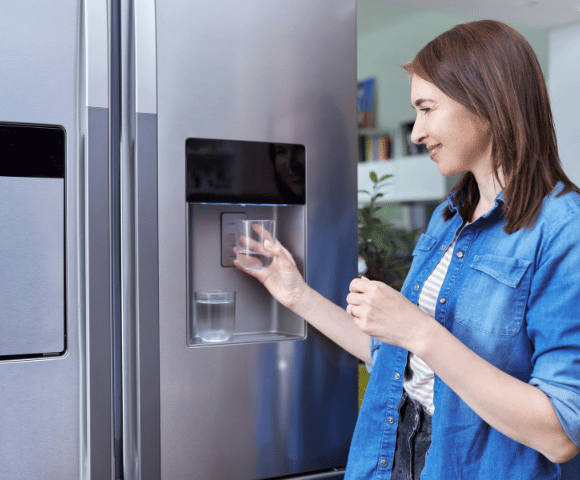
Under-sink water filters
Under-sink filters are convenient once installed and don’t take up any space on your counter or in your fridge. They can filter a lot of water at once and can be very effective in removing harmful contaminants. The downside is that under-sink filters may need to be professionally installed, which may or may not include drilling a hole through the sink or countertop and potentially swapping your faucet for one that’s compatible with the system.
If you’re in search of an under sink water filter that does not use any permanent fixtures or requires drilling a hole, look for a direct connect water filter. These filters still live under your sink, but connect to your cold water line, filtering the water that comes out of your existing faucet. For an easy to install, direct connect filter, the Claryum® Direct Connect reduces 78 contaminants directly out of your faucet for on-demand filtration.
Again, the type of certification will determine which contaminants are removed (more on that below) but under-sink filters are more comprehensive than water filter pitchers, refrigerator filters, and faucet-mounted filters because they typically include several stages of filtration. They’re designed to filter sediments, heavy metals, and chemicals.
Prices can range from $60 to over $500. You may also have to take into account installation costs if it’s not something you can DIY, which can be from $170 to $580. Replacement schedules will vary depending on the stages of filtration in each system, as some filter cartridges may need to be replaced more often than others.
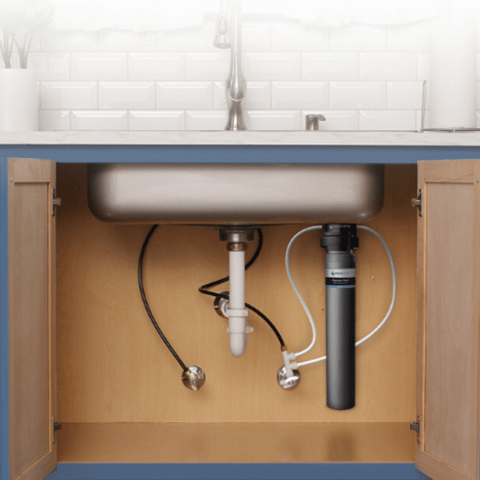
Countertop water filters
Countertop filters are the most convenient option for renters or for those unable to make plumbing modifications because they are portable and don’t require permanent installation. Some countertop filters overlap with faucet mounted filters, if you consider the external block to make it more of a countertop system. However, other countertop water filters can be completely away from the kitchen faucet. For example, the Clean Water Machine can be plugged in anywhere with an outlet to accommodate the kitchen space you have available.
There’s a wide variety of countertop water filters, including those with carbon filtration, ion - exchange, ultraviolet light, sub-micron mechanical filtration, or a combination of these. And each type of filtration media helps with removing different contaminants. Some countertop filters on the market can filter up to 99% of 78 contaminants.
Costs range from $80 to more than $1,000, but you likely won’t have to worry about additional installation costs with an easy to DIY process. When it comes to replacements, some filters feature multiple stages of filtration but you can typically expect them to last between 6-12 months.
COUNTERTOP WATER FILTER
Clean Water Machine
Claryum® technology filters 78 contaminants including lead and PFAS at the push of a button. No installation.
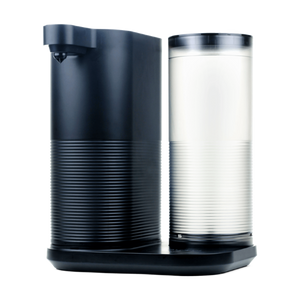
Whole house water filters
Whole house water filters can filter all water entering your home, not just water used for drinking or cooking. It can protect your appliances, your hair and your skin, among other things. The main concern for many is the initial cost and the need for professional installation and maintenance.
Whole house water filters feature multiple stages of filtration, and you can customize your filter to meet your needs such as adding a softener to address hard water or adding a UV filter for viral contaminants. Most whole-house systems will use a combination of filtration media such as a sediment pre-filter, activated carbon, and copper-zinc (KDF), or reverse osmosis.
On average, a whole house water filter can cost from $1,000 to over $4,000. Installation costs will also vary but can cost between $850 to $5,400 on average. Whole house systems have a higher capacity compared to alternatives, with some filters lasting up to 10 years which means they’re low maintenance. However, systems with multiple stages of filtration may require replacements to additional filters more frequently than the main unit.
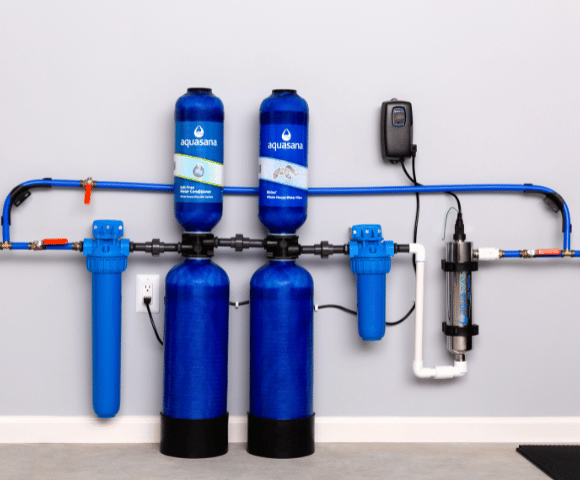
Reverse osmosis water filters
Reverse osmosis water filters are the most effective water filtration systems. The major benefit of RO is the wide range of contaminants it’s able to remove and depending on your preferences, you can find this filtration for under-sink, countertop, or whole house. Because they’re so effective, they also remove healthy minerals from your drinking water so it’s important to find a RO filter with remineralization.
Only a reverse osmosis system can remove fluoride from your drinking water. The reverse osmosis process also removes sodium, sulfate, nitrate, iron, zinc, mercury, lead, arsenic, chloride, and cyanide, along with a few other water contaminants. Reverse osmosis filtration media works by pushing water through a semi-permeable membrane that traps anything larger than a water molecule.
Prices can vary depending on if the reverse osmosis system is under-sink, countertop, or whole house. It ranges from $150 to $4,800 with an average cost of $2,200. Replacement schedules vary by unit, with some requiring filter swaps every year while others can last several years.
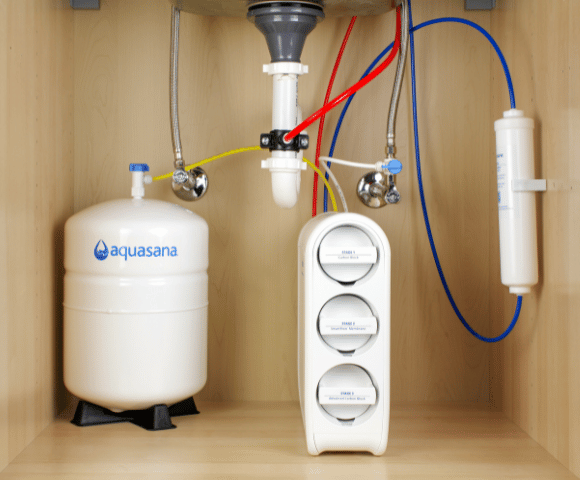
What you need to know before buying a water filter
Before making a purchase, you should always check a water filter's packaging for a stamp or seal confirming which contaminants the filter is certified to remove. It's important to ensure a water filtration system is tested and certified to NSF Standards by an unbiased third-party testing group like the Water Quality Association (WQA), the International Association of Plumbing and Mechanical Officials (IAPMO).
When looking at different water filters and certifications, various systems will have different testing standard numbers. These numbers indicate what the system was tested for, according to the NSF Standards. Here are a few NSF standards to be aware of.
- Standard 42: Reduces aesthetic impurities like chloramine, chlorine, taste, and odor.
- Standard 53: Reduces contaminants with health effects. These contaminants include asbestos, cysts, PFOA/PFOS, VOCs, and more.
- Standard 55: Sterilizes bacteria, viruses, and cysts. This standard is associated with ultraviolet treatment systems that use a UV lamp.
- Standard 58: A reverse osmosis only standard that incorporates filtration through a semi-permeable membrane. Reduces arsenic, fluoride, TDS, and more.
- Standard 401: Removes emerging compounds/incidental contaminants like prescription drugs, over-the-counter medications, herbicides and pesticides, as well as chemical compounds like BPA.
- Standard P473: Reduces perfluorooctanoic acid (PFOA) and perfluorooctane sulfonate (PFOS) — chemicals used to make non-stick cookware, fire retardant, and more. In 2019, NSF combined Standard P473 into NSF Standard 53, so you may not see it listed for new filters.
- Standard P231: This reduces microbial contaminants like bacteria and viruses.
- Standard 372: This minimizes lead contamination, consistent with the United States Safe Drinking Water Act (SDWA).
Aquasana: Quality water filtration systems you can trust
Choosing the best water filter ultimately comes down to what specific contaminants need to be filtered from your water, where you want to install your filter (or perhaps you don't want to install anything), and your budget. Aquasana has a wide range of water filters whether you need under sink, countertop, or whole house systems. All of our water filtration systems are tested and certified through NSF or through WQA and IAPMO to meet NSF standards.
If contaminant removal is your top priority, we recommend the Aquasana SmartFlow® Reverse Osmosis filter, which removes up to 99.99% of 90 contaminants including fluoride, arsenic, chlorine, and lead. It also features a remineralizer so you'll retain healthy minerals that are beneficial to your body and contribute to a better taste in the water you use.
If you're still unsure which water filter is best for you, contact us and we'll be happy to help.
